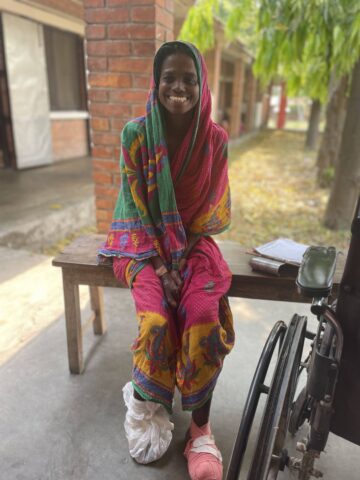
Sangeeta’s story: Battling leprosy stigma in Nepal
“I am still alive.”
Today, Sangeeta gives thanks for her life, despite navigating the terrible effects of leprosy and crushing stigma from her family and community.
Sangeeta is a member of Nepal’s Sada caste, who are frequently outcasts in their communities. Her husband and father-in-law spent much of the family’s income on alcohol, so Sangeeta worked as a farm laborer to help support her children.
When she first visited Lalgadh Leprosy Hospital and Services Center in 2020 for ulcer treatment, Sangeeta stayed for a whole month to get the care she needed. Years before, she didn’t finish a full course of the MDT drugs that cure leprosy. As a result, Sangeeta had numbness and disabilities in her hands and feet, as well as problems with her eyes. Despite these hardships, Sangeeta was thrilled to return to her children after the ulcer healed.
But conditions only worsened for Sangeeta and her family.
In 2022, Sangeeta developed another ulcer on her right foot. It looked and smelled so bad that the community drove her out of the village, down to the river where the dead are cremated. The villagers urged Sangeeta’s husband to poison her, then punished him when he didn’t. Abandoned by the village and her husband, Sangeeta nearly starved, but managed to escape and make her way back to Lalgadh.
This time, Sangeeta stayed at Lalgadh much longer, recovering from her physical and emotional trauma. Although her eldest daughter accompanied her, she went months without seeing her other children. Eventually, her village chased out the whole family because of their ties to Sangeeta, and they visited her at Lalgadh.
“I was happy because I was able to see my family,” Sangeeta explained. “I hadn’t seen them in about two months, so I was overjoyed.”
The team at Lalgadh recognized that Sangeeta needed more than a medical intervention to make a lasting difference in her life. After her family returned home, two of Lalgadh’s community development staff accompanied Sangeeta on a visit to her village.
The situation of Sangeeta’s family was distressing: a small, damaged house, no money for food, and the family banned from using the public water tap. Still, Lalgadh’s staff knew these issues were only symptoms of the larger problem: they spent time educating the village about the causes of leprosy and the importance of their participation in Sangeeta’s rehabilitation. This education will be the foundation for Sangeeta to build a life where she is accepted, not ostracized the way she was in the past.
Through thousands of stories like Sangeeta’s, Lalgadh Hospital demonstrates what a commitment to end leprosy means: not just medicine and treatment, but restoration to a whole and healthy life.